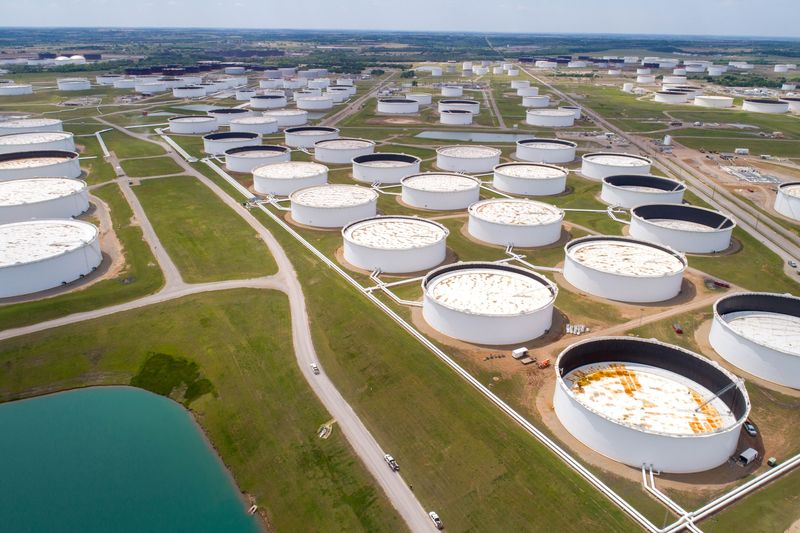Oil falls 2% on recession fears, swelling US fuel stocks

FILE PHOTO: Crude oil storage tanks are seen in an aerial photograph at the Cushing oil hub in Cushing, Oklahoma, U.S. April 21, 2020. REUTERS/Drone Base
LCO
+0.80%
Add to/Remove from Watchlist
Add to Watchlist
Add Position
Position added successfully to:
Please name your holdings portfolio
Type:
BUY
SELL
Date:
Amount:
Price
Point Value:
Leverage:
1:1
1:10
1:25
1:50
1:100
1:200
1:400
1:500
1:1000
Commission:
Create New Watchlist
Create
Create a new holdings portfolio
Add
Create
+ Add another position
Close
CL
+0.92%
Add to/Remove from Watchlist
Add to Watchlist
Add Position
Position added successfully to:
Please name your holdings portfolio
Type:
BUY
SELL
Date:
Amount:
Price
Point Value:
Leverage:
1:1
1:10
1:25
1:50
1:100
1:200
1:400
1:500
1:1000
Commission:
Create New Watchlist
Create
Create a new holdings portfolio
Add
Create
+ Add another position
Close
TSLA
+1.28%
Add to/Remove from Watchlist
Add to Watchlist
Add Position
Position added successfully to:
Please name your holdings portfolio
Type:
BUY
SELL
Date:
Amount:
Price
Point Value:
Leverage:
1:1
1:10
1:25
1:50
1:100
1:200
1:400
1:500
1:1000
Commission:
Create New Watchlist
Create
Create a new holdings portfolio
Add
Create
+ Add another position
Close
By Laila Kearney
NEW YORK (Reuters) -Oil prices slid by about $2 a barrel to their lowest level since late March on Thursday, dragged lower by fears a possible recession could dent fuel demand and after a rise in U.S. gasoline inventories.
Brent crude futures settled at $81.10 a barrel, shedding $2.02, or 2.4%. West Texas Intermediate crude (WTI) futures settled at $77.29 a barrel, losing $1.87, or 2.4%.
Both benchmarks fell 2% on Wednesday and are at their lowest since just before a surprise OPEC+ production cut announcement.
«At the end of the day, one of the big reasons why we’re sliding is fear of recession,» said Bob Yawger, executive director of energy futures at Mizuho.
The number of Americans filing new claims for unemployment benefits increased moderately last week, indicating the labor market was slowing after a year of interest rate hikes by the U.S. Federal Reserve, and fanning concerns about a slowdown in fuel demand.
Gasoline inventories jumped unexpectedly last week by 1.3 million barrels to 223.5 million barrels, the U.S. Energy Information Administration said in its report on Wednesday. [EIA/S] [API/S]
Implied gasoline demand also fell 3.9% from year-ago levels to 8.5 million barrels a day. U.S. crude stockpiles, meanwhile, dropped by 4.6 million barrels, but analysts said that decline could be short-lived.
«Although yesterday’s EIA crude stock draw of more than 4.5 million barrels looked supportive, all of the reduction was related to a spike in crude export activity that could easily be reversed in next week’s EIA,» said Jim Ritterbusch of consultancy Ritterbusch and Association.
Easing some concern about a rate hike-induced recession in the world’s largest oil consuming nation, economists polled by Reuters expected the Fed to end its tightening with a final 25 basis point rate rise in May.
In Britain, persistent double-digit inflation has bolstered expectations of a further Bank of England rate hike.
On the supply side, oil loading from Russia’s western ports in April is likely to rise to the highest since 2019, trading and shipping sources said.
Pakistan has placed its first order for discounted Russian crude under a new deal which could cover 100,000 barrels per day, the country’s petroleum minister said.
Also weighing on crude prices, equity markets, which often move in tandem with oil prices, were down after disappointing results from Tesla (NASDAQ:TSLA) and other companies.


